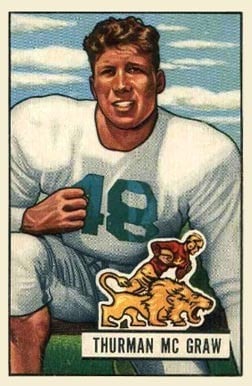In this series, we profile remarkable people from Garden City who went out into the world and made their mark on history. We want to be sure their stories are not forgotten.
In this article, we profile Thurman “Fum” McGraw (1927 – 2000), a WWII veteran, multi-sport collegiate athlete, professional football player, professional football coach, and collegiate athletics administrator. Read on to learn more about this remarkable Garden City native.
Early Life
While known as a larger-than-life figure in Colorado sports, McGraw was born in Garden City, Kansas on July 17, 1927. His nickname “Fum” was created by a younger sibling who couldn’t pronounce “Thurman,” and it stuck with him throughout his life.
Even at a young age, McGraw showed a remarkable talent for athletics, which would serve him well in his college and professional careers. Later, his family moved to Colorado where he would go on to earn athletic glory.
By the time he was a senior in high school, McGraw had lettered in football, basketball, and baseball, and was a regional heavyweight boxing champion. College was the next obvious step for this talented athlete but unfortunately, like for so many Americans of his generation, fate intervened.
World War II
McGraw was just 16 years old when the attack on Pearl Harbor occurred, which galvanized his resolve to fight for his country. At the age of 18, he was finally old enough to leave high school early and join the US Marine Corps. He was deployed to the far east to catch the tail end of the war.
Following the Japanese surrender, McGraw returned home to Colorado, ready to embrace his athletic destiny. McGraw made it home physically intact but with the extra wisdom and experience common to young men of his generation.
Colorado State University
In 1946, McGraw enrolled in Colorado State University (then Colorado A&M) where he would go on to make history as a Ram athlete. At this point, McGraw had grown into a massive 6’5”, 235-pound athlete, ready to fight for a starting spot on the football team.
Four years of college later, McGraw was a legend. As a starting defensive tackle, McGraw earned All-American honors in 1948 and 1949 for exceptional ability on the football field. He also earned All-American status in wrestling (1948) and track and field (1949, discus). McGraw is the only athlete in Colorado State University history to be an All-American in three separate sports.
Despite these achievements, football was always his main focus. Using his broad athletic experience, he combined aspects of boxing and wrestling to become a unique defensive threat, able to plow through offensive linemen with ease.
However, McGraw was not just out for individual glory. His excellence on the field encouraged his fellow players to reach their own potential as well. During his freshman year with the Rams, the team barely managed to win two games. By the time he was a senior, McGraw helped lead the Rams to a 9-1 record, which was the best record in Ram football history.
At this point, McGraw was the most accomplished athlete in the history of the school, dominating several sports and leading a powerhouse football team. With his college career complete, he set off on his next great challenge: professional sports.
The Detroit Lions
Following his stellar college career, McGraw was an easy choice for NFL teams seeking a defensive threat, eventually being drafted by the Detroit Lions NFL franchise in 1950. In his first year, he was named Rookie of the Year and was selected to the pro bowl. Once again, McGraw was making a name for himself with his athletic gifts.
In 1951 and 1952, McGraw was selected to the All-Pro team, a collection of the most elite players in the league. Plus, in 1954, he was made a co-captain of the Detroit Lions.
Just as at Colorado State, McGraw had the ability to inspire the other players around him. McGraw’s Lions teams would go on to win NFL championships in 1952 and 1953, cementing his position as one of the best players in the game.
Sadly, McGraw’s promising career was cut short due to a knee injury in 1954. While the injury may not be a career-ender today, in the 1950s, it was enough to send a player home from the NFL. With that, McGraw’s professional sports career — as a player — was over.
Coaching at Colorado State
Seeking out the next chapter of his life, McGraw returned to Colorado State in 1955. Drawing on his vast experience as a war veteran and professional athlete, he took on assistant coaching duties for the football and wrestling teams.
The athletes under his tutelage immediately took to his friendly but professional style. They were especially receptive to this former Ram who had been so successful both at Colorado State and in the NFL. By 1957, he had worked his way into the head wrestling coach spot.
Back to the NFL
McGraw’s time coaching at Colorado State didn’t last too long as the NFL again came knocking. This time, the Pittsburgh Steelers were looking for a line coach and McGraw was the perfect candidate. He remained with the team until 1962, helping them compile a 30-29-3 record and helping to lay the groundwork for their eventual championship teams.
Despite his NFL coaching success, McGraw felt a call to return to his beloved Colorado.
Return to Colorado State
After an adventurous life as a marine, college athlete, and pro football player and coach, McGraw was looking to settle down. In 1965, McGraw was named Assistant Athletic Director at Colorado State. Aside from a brief stint as an NFL scout, McGraw remained an integral part of Colorado State Athletics administration for the remainder of his professional life.
From 1976 to 1986, McGraw served as Colorado State’s athletic director, playing a key role in the construction of several athletic facilities including Moby Arena and Hughes Stadium. His efforts reflect a lifetime of commitment to the school’s athletic programs. In 1986, McGraw retired to live in Colorado.
Death and Legacy
McGraw died peacefully in 1981 at the age of 73. He left behind a proud legacy in the sports world, both in and out of Colorado. He was elected to the Colorado sports hall of fame, the Pro Football Hall of Fame, the Colorado State All-Century team, and his jersey number (48) was retired by the school.
As a final recognition of McGraw’s contributions to Colorado State athletics, the school designated McGraw Athletic Center in his honor.
Conclusion
Through hard work and determination, Thurman “Fum” McGraw cemented his position in collegiate and professional sports history. His life is an inspiration to anyone seeking to rise above humble beginnings to make their mark on the world.
While McGraw is most famously known as one of the great Colorado athletes, it should always be remembered that he started his life right here in Garden City. Stay tuned for more Profiles in History about Garden City’s famous sons and daughters!


